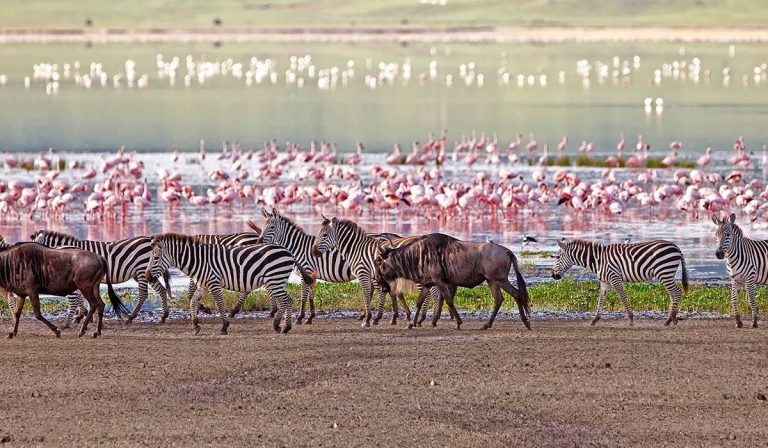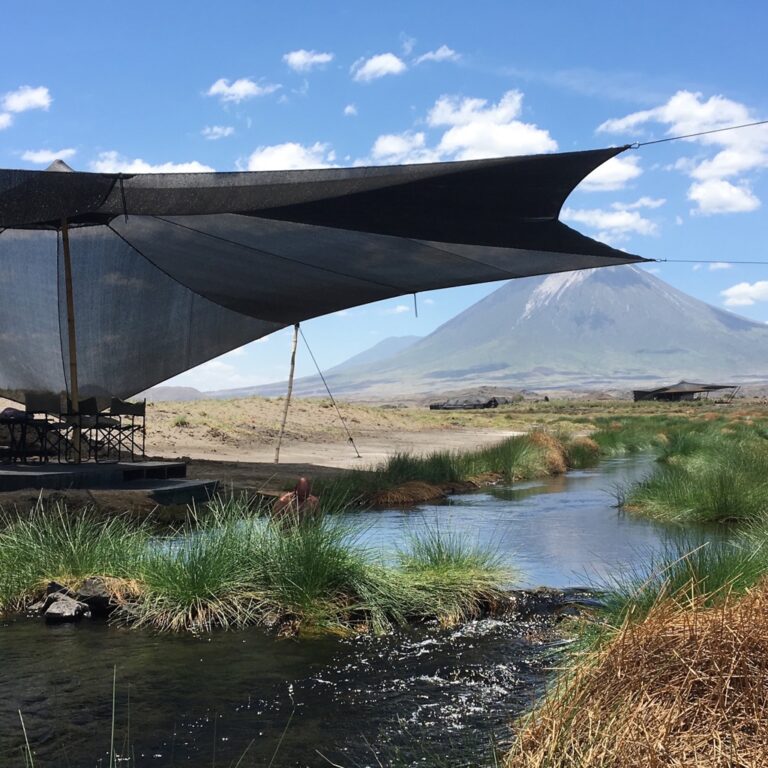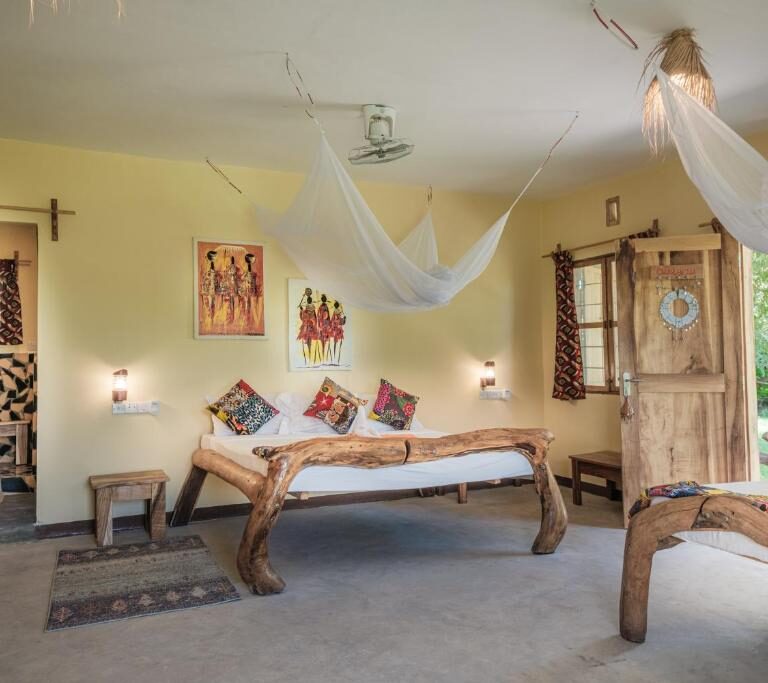An African safari is generally safe when proper precautions are taken, such as using reputable tour operators and following your guide’s instructions. While inherent risks exist, they are significantly minimized by staying in designated areas, respecting wildlife, and taking health precautions like vaccinations and avoiding untreated water.
An African safari is one of the most extraordinary adventures you can experience — a journey through vast savannas, dense forests, and shimmering lakes, where elephants roam free, lions patrol the grasslands, and birds paint the skies with color. Yet, with all its beauty and raw wilderness, one common question arises: Is an African safari safe? The best African Safari is safe for families, kid-friendly, honeymooners/couples, solo female and male travelers, and seniors.
The short answer is yes — African safaris are remarkably safe when properly organized and when visitors follow essential safety rules. Modern safari tourism is built on decades of experience, expert guides, and well-established safety standards. But it’s also important to remember that you are stepping into wild territory, where both nature and culture deserve respect. Let’s explore how you can ensure a safe and enjoyable safari experience — and the key factors every traveler should understand before venturing into Africa’s wild heart.
1. Listen to Your Guide – The Golden Rule of Safety
Your safari guide is your greatest asset — a seasoned expert who knows the landscape, the animals, and the rhythm of the wild. These professionals not only knowledgeable about wildlife behavior but are also trained in safety, first aid, and emergency response. Listening to your guide isn’t just about following instructions — it’s about survival and respect. They know when it’s safe to approach an animal, when to stay back, and how to interpret subtle changes in animal behavior.
For instance, while a herd of elephants may appear calm, a slight ear flap or trunk movement could signal irritation. Your guide can read those cues instantly and act accordingly. Always remember: your guide’s word is final. Whether they tell you to remain seated, lower your voice, or wait before taking photos, these instructions meant to keep everyone safe — including the wildlife.
2. Stay in the Vehicle – The Safari Shield
One of the simplest but most vital safety rules on any safari is to stay inside the vehicle at all times unless your guide tells you it’s safe to step out. Safari vehicles designed not only for comfort and visibility but also for protection. To most animals, these vehicles appear as large, non-threatening objects. The moment you step out or lean too far, that illusion breaks — and you become a potential threat or prey.
Lions, leopards, and even seemingly calm animals like buffalo or elephants can react aggressively if startled or approached too closely. Resist the temptation to get that perfect photo by leaning out of the vehicle or standing up suddenly. Your best (and safest) wildlife photos will come from patience and respect, not proximity.
3. Keep Quiet and Still – Blend Into the Wild
A safari is not a zoo visit. Out here, you’re in the animals’ world — and silence is your best companion. Loud noises, sudden movements, or shouting can disturb animals, scare them away, or provoke aggression. When observing a pride of lions or a family of elephants, your quietness allows them to remain relaxed and behave naturally. You’ll witness authentic wildlife behavior — mothers nursing calves, cubs playing, predators stalking — instead of frightened or defensive reactions.
Quiet observation not only enhances safety but also deepens your experience. Many travelers say that the stillness of the bush — broken only by the calls of birds or the distant roar of a lion — is one of the most moving parts of their journey. So, when your guide signals for silence, take it as an invitation to connect with the wilderness on its own terms.
4. Maintain a Safe Distance – Respect the Wild’s Boundaries
Every animal, from a towering giraffe to a resting rhino, has an invisible comfort zone. Crossing that line is what often leads to danger. Maintaining a safe distance ensures not just your safety but the animals’ peace as well. Most parks have strict rules regarding how close vehicles may get to wildlife — often between 25 to 50 meters, depending on the species.
Professional guides understand these boundaries instinctively. They know when to move closer, when to back away, and how to position the vehicle for both safety and optimal viewing.
This rule also applies when on foot, during walking safaris or camp visits. Always follow your guide’s lead and never approach wildlife alone. Even small animals like baboons or warthogs can become aggressive if they feel cornered. In essence, the golden principle of safari safety is respect. Give nature its space, and it will reward you with extraordinary encounters.
5. Book with Reputable Operators – Experience and Safety Matter
Not all safari operators are created equal. Booking with a reputable, licensed, and experienced tour company can make the difference between a safe, smooth safari and a risky one. Trusted operators employ certified guides, maintain their vehicles properly, carry first-aid and communication equipment, and follow national park safety regulations. They also know how to handle medical or logistical emergencies efficiently.
Before booking, check reviews, certifications, and affiliations. Look for operators who are registered with local tourism authorities or safari associations such as the Tanzania Association of Tour Operators (TATO) or Kenya Association of Tour Operators (KATO).
Reputable companies will also provide detailed pre-trip briefings, health and safety advice, and 24-hour support throughout your safari. Remember: the cheapest option isn’t always the safest. In the wild, professionalism and experience are worth every penny.
6. Avoid Walking Alone at Night – Camp Safety Essentials
One of the magical aspects of a safari is staying in lodges or tented camps set deep within nature — where the night echoes with the calls of hyenas, crickets, and distant lions. But this beauty comes with a rule: never walk alone at night. Even in fenced lodges, wildlife can sometimes wander close. In unfenced camps, it’s not uncommon for animals to pass through — elephants grazing nearby, hippos returning to the river, or hyenas sniffing around the edges.
That’s why camps have clear safety protocols. Always ask for an escort (usually an armed ranger or camp staff) when moving between your tent and the main area after dark. Never wander off, even if you hear noises — especially near rivers or bushes. Keep your flashlight handy, zip your tent securely, and avoid leaving food or scented items outside. These precautions might seem simple, but they’re vital in keeping you safe while you enjoy the serenity of the African night.
7. Get Travel Insurance – Peace of Mind in the Wild
Comprehensive travel insurance is essential for any safari traveler. Even though safaris are generally safe, unforeseen events — such as flight cancellations, medical emergencies, or lost luggage — can happen anywhere. Choose insurance that covers medical evacuation, especially if you’re visiting remote parks or climbing mountains. Most safari destinations have excellent lodges but limited access to major hospitals. In emergencies, evacuation by air might be required — and it can be expensive without proper coverage.
Also, ensure your policy includes trip cancellation, theft, and loss protection. Peace of mind allows you to focus on what truly matters: the adventure.
Important Considerations
While following safety guidelines will keep you secure in most situations, it’s wise to understand a few broader realities about safari travel.
Crime – Urban Caution, Rural Calm
In most safari destinations, crime extremely low in the parks and rural areas where safaris take place. The wilderness not where crime happens — wildlife reserves are well-patrolled and secure. However, petty crime like pickpocketing can occur in cities or transit hubs such as Nairobi, Arusha, or Johannesburg. To stay safe, practice basic precautions:
Avoid flashing valuables or large sums of cash.
Keep your passport and travel documents secure. Use hotel safes for important items. Move around with registered taxis or your tour operator’s transport. By staying alert in cities and relaxed in the wild, you’ll find Africa to be as safe — if not safer — than many popular global destinations.
Risk Is Inherent – But Managed with Care
Every adventure carries a level of risk, whether you’re hiking a mountain, diving into the ocean, or watching lions in the savanna. The goal is not to eliminate risk but to manage it intelligently. African safari operators, park authorities, and guides have spent decades refining safety standards. Vehicles regularly inspected, guides undergo rigorous training, and park regulations are strictly enforced.
Even wild animal encounters carefully managed. Most incidents occur only when tourists disregard safety rules or try to approach animals too closely. By listening, observing, and respecting, you minimize risk to nearly zero. The wilderness is unpredictable — and that’s part of its allure. But with preparation and awareness, it’s also profoundly safe.
Respect the Environment – The Foundation of Safety
Safety on safari goes beyond protecting yourself — it’s about protecting the environment that hosts you. Respecting nature ensures that both humans and wildlife coexist peacefully. Avoid littering, feeding animals, or damaging plants. Stick to marked roads and trails. These actions prevent animals from associating humans with food and preserve the fragile ecosystems you came to witness.
Many safari camps and lodges now operate on eco-friendly principles, using solar power, waste recycling, and local conservation initiatives. Supporting such sustainable practices contributes to long-term safety — for future visitors and for the animals themselves.
The Safest African Country to Visit for Safari
Botswana, Rwanda, and Tanzania consistently ranked as some of the safest countries for a safari in Africa. Botswana known for its political stability and low crime rates. Rwanda for its peace and cleanliness, and Tanzania for its friendly locals and established tourism infrastructure. Namibia, also frequently cited as a safe option due to its low population and stable environment. To stay safe on a Tanzania safari, always follow your guide’s instructions, especially regarding wildlife. Stay inside safari vehicles, keep arms and legs inside, and maintain a safe distance from all animals. Be prepared for weather changes by dressing in layers, and take precautions against mosquitoes and sun exposure.
How Safe Is a Safari in Tanzania? Find the Truth
A safari in Tanzania is generally very safe when you follow your guide’s instructions and take standard precautions against wildlife and health risks. Major tourist areas like the Serengeti are secure, but some urban areas have higher petty crime rates and specific regions like the Zanzibar Archipelago may have higher crime and terrorism risks, so it’s important to stay informed and take extra caution there. Safety relies on choosing a reputable tour operator and listening to expert guides who know how to handle wildlife encounters and ensure your well-being.
Safari safety tips (not just for dummies)
To stay safe on a safari, always follow your guide’s instructions and never provoke or feed animals. Maintain a safe distance from wildlife. Stay inside the vehicle unless told it’s safe to exit, and be especially careful on walking safaris and at night. Also, protect against diseases by taking necessary medical precautions and use bug repellent.
Can solo travelers go on safari safely?
Definitely. Safaris are very safe for solo travelers. Many reputable operators offer group tours or personalized itineraries with professional guides who ensure comfort and safety throughout.What’s the biggest safety tip for a first-time safari-goer?
Trust your guide, respect the animals, and stay alert. The more you blend into the rhythm of the wild, the safer — and more rewarding — your safari experience will be.How To Stay Safe While on Safari in Africa?
To stay safe on an African safari, always listen to your guide, stay inside the vehicle unless told otherwise, and never make loud noises or sudden movements around animals. Wear neutral-colored clothing, pack appropriate gear like sunscreen and insect repellent, and take precautions at camps by not wandering alone, especially at night.
Is It Safe To Travel to Tanzania?
Yes, it is generally safe to travel to Tanzania, especially to the main tourist destinations like national parks and Zanzibar, as the country’s tourism industry is open and operating normally. However, travelers should be aware of safety concerns, particularly in cities, and follow standard precautions like avoiding walking alone at night, securing valuables, and being cautious around large crowds. Travelers should also consult their specific home country’s travel advisories, as some governments have higher-level warnings due to past unrest and advise caution or reconsideration of non-essential travel.
Ultimate Guide to African Safari Safety Tips
To have a safe African safari, always listen to and follow your guide’s instructions, as they are the experts. Stay inside the safari vehicle unless your guide says it’s safe to exit, keep windows closed, and avoid loud noises or sudden movements. At the camp, never walk around alone at night and keep tent doors and windows zipped. Additionally, pack essentials like insect repellent, wear neutral-colored clothing, and get comprehensive travel insurance.
Mistakes Tourists Make on African Safaris According to an Expert
According to experts, common mistakes tourists make on African safaris include overpacking and bringing the wrong clothes, such as bright colors. Other errors include expecting constant action, choosing a budget operator without understanding limitations, or ignoring local culture. Experts also advise against not booking in advance, skipping cultural experiences, not staying hydrated, or forgetting to bring binoculars and a proper camera.
How Dangerous is a Safari Safety Tips for Travelers?
A safari is generally safe if you follow your guide’s instructions, stay inside your vehicle during game drives, and maintain a safe distance from wildlife. To stay safe from health risks like malaria, use insect repellent, wear protective clothing, and consider pre-trip vaccinations. By prioritizing health, adhering to safety protocols, and booking with a reputable operator, you can greatly minimize the risks.
Are walking safaris safe?
Yes, walking safaris are safe when led by experienced, armed guides and rangers. They follow strict rules, keep a safe distance from wildlife, and teach guests how to behave in the bush.How safe are the safari lodges and camps at night?
Very safe. Lodges are either fenced or have trained staff who monitor wildlife movements. Guests are always escorted to their rooms after dark. Never walk alone at night without an escort.Common Mistakes while on Safari in Tanzania
Common mistakes on a Tanzanian safari include ignoring wildlife etiquette (making noise, feeding animals) and guide instructions, booking in the wrong season, overpacking, packing inappropriate clothing (bright colors), skipping travel insurance, and not budgeting for all costs. Being loud, standing up in vehicles, and touching animals are all mistakes that can disturb wildlife and break park rules.
Is it safe to travel with children on a safari?
Absolutely. Many lodges and camps cater to families with safety measures, child-friendly guides, and educational programs. However, children must always be supervised and follow all safety instructions.
10 Tips on Vehicle Etiquette on Safari
How Safe is Climbing Mount Kilimanjaro?
Is it safe to safari in Tanzania?
Ultimate Guide to Tanzania Safari Safety Tips, 2025
Tanzania Travel Advice & Safety
Final Thoughts – Safe, Spectacular, and Soulful
So, how safe is an African safari? The answer lies in balance: Africa’s wilderness demands respect but rewards you with unmatched beauty and tranquility. With an experienced guide, a reputable operator, and adherence to basic safety rules, your safari is as safe as any adventure vacation. Each precaution — from staying in the vehicle to keeping quiet — enhances not only your safety but also the authenticity of your experience.
Thousands of travelers journey across Africa every year, from the Serengeti to the Maasai Mara, from Kruger to the Okavango Delta as safe African Safari destinations— and return home with hearts full of awe, not fear. Safety, in the end, isn’t about eliminating danger. It’s about understanding your surroundings, trusting your guide, and respecting the wild. When you do, Africa opens its arms to you — vast, untamed, and magnificently safe.








